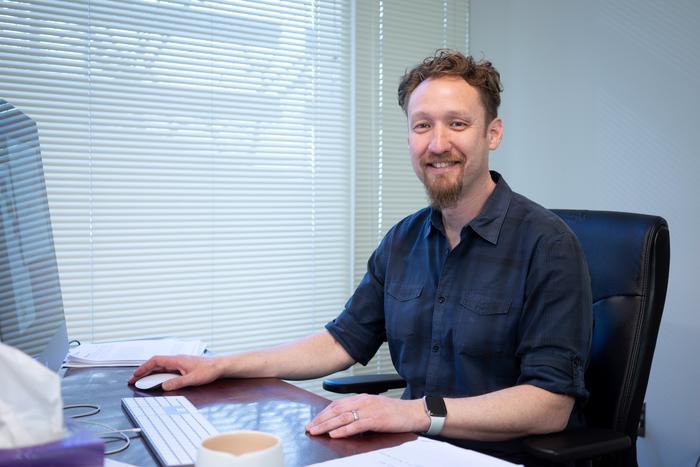What happens in the human brain when we learn from positive and negative experiences? To help answer that question and better understand decision-making and human behavior, scientists are studying dopamine.

Credit: Wake Forest University School of Medicine
What happens in the human brain when we learn from positive and negative experiences? To help answer that question and better understand decision-making and human behavior, scientists are studying dopamine.
Dopamine is a neurotransmitter produced in the brain that serves as a chemical messenger, facilitating communication between nerve cells in the brain and the body. It is involved in functions such as movement, cognition and learning. While dopamine is most known for its association with positive emotions, scientists are also exploring its role in negative experiences.
Now, a new study from researchers at Wake Forest University School of Medicine shows that dopamine release in the human brain plays a crucial role in encoding both reward and punishment prediction errors. This means that dopamine is involved in the process of learning from both positive and negative experiences, allowing the brain to adjust and adapt its behavior based on the outcomes of these experiences.
The study was published today in Science Advances.
“Previously, research has shown that dopamine plays an important role in how animals learn from ‘rewarding’ (and possibly ‘punishing’) experiences. But, little work has been done to directly assess what dopamine does on fast timescales in the human brain,” said Kenneth T. Kishida, Ph.D., associate professor of physiology and pharmacology and neurosurgery at Wake Forest University School of Medicine. “This is the first study in humans to examine how dopamine encodes rewards and punishments and whether dopamine reflects an ‘optimal’ teaching signal that is used in today’s most advanced artificial intelligence research.”
For the study, researchers on Kishida’s team utilized fast-scan cyclic voltammetry, an electrochemical technique, paired with machine learning, to detect and measure dopamine levels in real-time (i.e., 10 measurements per second). However, this method is challenging and can only be performed during invasive procedures such as deep-brain stimulation (DBS) brain surgery. DBS is commonly employed to treat conditions such as Parkinson’s disease, essential tremor, obsessive-compulsive disorder and epilepsy.
Kishida’s team collaborated with Atrium Health Wake Forest Baptist neurosurgeons Stephen B. Tatter, M.D., and Adrian W. Laxton, M.D., who are also both faculty members in the Department of Neurosurgery at Wake Forest University School of Medicine, to insert a carbon fiber microelectrode deep into the brain of three participants at Atrium Health Wake Forest Baptist Medical Center who were scheduled to receive DBS to treat essential tremor.
While the participants were awake in the operating room, they played a simple computer game. As they played the game, dopamine measurements were taken in the striatum, a part of the brain that is important for cognition, decision-making, and coordinated movements.
During the game, participants’ choices were either rewarded or punished with real monetary gains or losses. The game was divided into three stages in which participants learned from positive or negative feedback to make choices that maximized rewards and minimized penalties. Dopamine levels were measured continuously, once every 100 milliseconds, throughout each of the three stages of the game.
“We found that dopamine not only plays a role in signaling both positive and negative experiences in the brain, but it seems to do so in a way that is optimal when trying to learn from those outcomes. What was also interesting, is that it seems like there may be independent pathways in the brain that separately engage the dopamine system for rewarding versus punishing experiences. Our results reveal a surprising result that these two pathways may encode rewarding and punishing experiences on slightly shifted timescales separated by only 200 to 400 milliseconds in time,” Kishida said.
Kishida believes that this level of understanding may lead to a better understanding of how the dopamine system is affected in humans with psychiatric and neurological disorders. Kishida said additional research is needed to understand how dopamine signaling is altered in psychiatric and neurological disorders.
“Traditionally, dopamine is often referred to as ‘the pleasure neurotransmitter,”’ Kishida said. “However, our work provides evidence that this is not the way to think about dopamine. Instead, dopamine is a crucial part of a sophisticated system that teaches our brain and guides our behavior. That dopamine is also involved in teaching our brain about punishing experiences is an important discovery and may provide new directions in research to help us better understand the mechanisms underlying depression, addiction, and related psychiatric and neurological disorders.”
This study was supported by grants from the National Institutes of Health: R01MH121099, R01DA048096, R01MH124115, P50DA006634, 5KL2TR001420, F31DA053174, T32DA041349 and F30DA053176.
Journal
Science Advances
DOI
10.1126/sciadv.adi4927
Subject of Research
People
Article Title
Subsecond fluctuations in extracellular dopamine encode reward and punishment prediction errors in humans
Article Publication Date
1-Dec-2023




